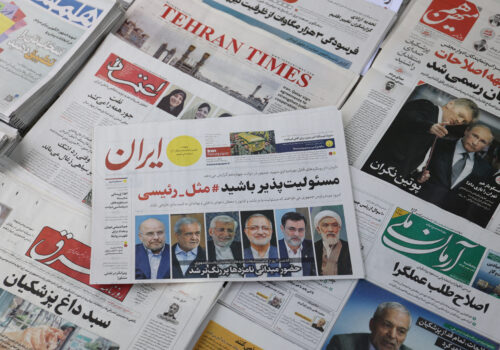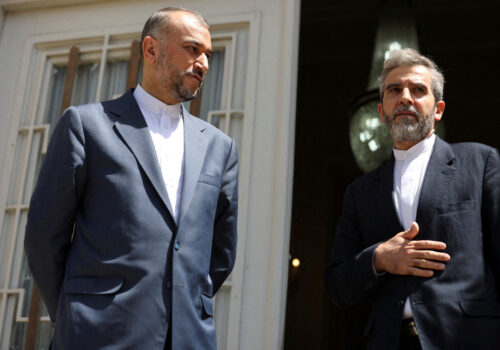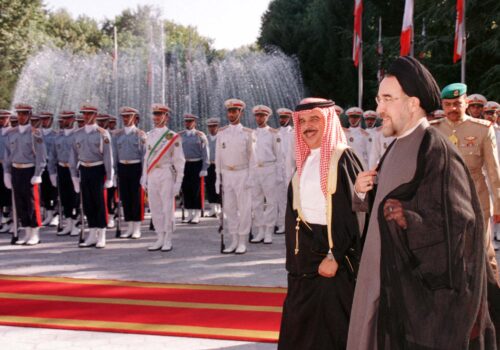Masoud Pezeshkian is a possible game changer in the upcoming Iranian presidential election
In a surprising move, the Guardian Council, a twelve-member vetting body, included a reformist politician along with the five conservative candidates for Iran’s presidential election on June 28. Masoud Pezeshkian stands out not only for his political background but also for his unique personal history and professional achievements.
Masoud Pezeshkian was born on September 29, 1954, in Mahabad, a city in West Azerbaijan province known for having a large population from the Azeri and Kurdish ethnic minorities. Despite being part of the 2 percent Azeri-speaking minority in a predominantly Sunni Kurdish city, Pezeshkian has always been proud of his Azeri heritage.
At nineteen, during Shah Mohammad Reza Pahlavi’s reign, he served his conscription duty in Zabul, one of the most deprived cities in Sistan and Baluchistan province. After completing his service, he returned to his home province, where he entered medical school and graduated with a degree in general medicine.
During the Iran-Iraq War (1980–1988), Pezeshkian frequently visited the front lines, where he was responsible for sending medical teams and working as a fighter and doctor. After the war, he continued his education, specializing in general surgery at Tabriz University of Medical Sciences. He later became a specialist in heart surgery, leading him to become president of Tabriz University of Medical Sciences in 1994, a position he held for five years.
SIGN UP FOR THIS WEEK IN THE MIDEAST NEWSLETTER
That same year, Pezeshkian lost his wife and one of his children in a car accident. He raised his remaining two sons and daughter alone and has never remarried. This personal story of loss and dedication has garnered sympathy and respect from many in Iranian society who view him as a compassionate and resilient figure.
Years later, Pezeshkian’s political journey began when he joined reformist Mohammad Khatami’s administration as deputy health minister in 1997. He was appointed health minister four years later, serving from 2001 to 2005. Since then, he has been elected to the Iranian parliament five times, representing Tabriz, and served as the first vice president of the parliament from 2016 to 2020.
Known for his reformist stance, Pezeshkian has criticized the government’s handling of political dissent. After the controversial 2009 post-election protests known as the Green Movement, he delivered a speech in parliament criticizing the security forces’ brutal response. This speech caused significant tension from conservative members, who attempted to interrupt.
During pragmatist Hassan Rouhani’s presidency, Pezeshkian strongly supported the 2015 nuclear deal, frequently speaking in its favor in parliament. In a rare state television interview during the nationwide anti-establishment protests following Mahsa Jina Amini’s death at the hands of the so-called morality police, Pezeshkian questioned the official narrative, citing his medical background when disputing the government’s explanation of her death. His call for an independent evaluation team highlighted his commitment to transparency and accountability.
Pezeshkian’s candidacy is significant for several reasons. Unlike many Iranian politicians, he did not rise to power through influential family connections or corruption. His unblemished record and tragic personal history distinguish him from his rivals. Moreover, he has the potential to attract votes from supporters of populist Mahmoud Ahmadinejad due to his simple Persian language and anti-corruption stance.
Despite these strengths, Pezeshkian faces significant challenges. He lacks clear and documented plans for running the country, particularly in foreign policy, where he defers to Supreme Leader Ayatollah Ali Khamenei. When mentioning Khamenei, he uses the respectful title “exalted supreme leader,” which is common among conservatives, while reformists prefer to address him with the title of “leader.” Pezeshkian’s loyalty to Khamenei may have secured his candidacy, but it might not be sufficient to win over the electorate, especially the middle class yearning for change.
Pezeshkian has been endorsed by the reformists, including former President Mohammad Khatami. The parties and key figures of this political faction have mobilized their efforts to ensure Pezeshkian’s victory in the presidential election. Additionally, Mohammad Javad Zarif, the former foreign minister, has been chosen as Pezeshkian’s foreign policy adviser and is actively participating in his election campaign.
His ability to appeal to ethnic minorities, particularly Azeris, could be a crucial factor in Pezeshkian’s campaign. Azeris form the majority population in the provinces of East Azerbaijan, West Azerbaijan, Ardabil, and Zanjan. According to the last census in 2016, the combined population of these provinces is less than ten million, representing about one-eighth of Iran’s total population. His hometown of Mahabad, with its mixed Kurdish and Azeri population, and his advocacy for minority rights position him as a unifying figure.
At the same time, this issue could become his Achilles’ heel. Pezeshkian’s strong emphasis on supporting minority rights in the country has raised concerns among some about the potential rise and expansion of pan-Azeri sentiments in Iran.
In the first election debate, held on June 17, Pezeshkian struggled to persuade undecided voters to participate. Some social media users argued that Mostafa Pourmohammadi, a moderate cleric with decades of experience in security, was more effective at influencing public opinion than Pezeshkian.
Pezeshkian has the potential to be a game changer in the upcoming presidential election, but he faces significant hurdles. To succeed, he must address the concerns of reformists and the broader electorate, who are still disillusioned and angry about the suppression of protests and the current state of the Islamic Republic. His record of public service, personal resilience, and advocacy for transparency and accountability will be key factors in his campaign.
Although many are still unsure how the Guardian Council allowed him to participate in the election, it is widely believed that the council was confident Pezeshkian would not win. By approving his candidacy, it appears that the council aimed to boost voter turnout.
Pezeshkian’s candidacy offers a glimmer of hope for those seeking change in Iran, but his path to victory is fraught with challenges. To truly change the game in the 2024 presidential election, he must navigate the complex political landscape, appeal to a diverse electorate, and present a clear vision for the future.
Saeid Jafari is a Middle East analyst based in Europe. Follow him on X: @jafariysaeid.
Further reading
Mon, Jun 17, 2024
Everything you need to know about the six candidates in Iran’s presidential election
IranSource By
Due to the unexpected death of former President Ebrahim Raisi in a helicopter crash, the Islamic Republic of Iran will hold presidential elections on June 28.
Fri, May 31, 2024
A nuclear negotiator takes the helm of Iran’s foreign ministry. So what’s next?
IranSource By
Speaking at the funeral of Hossein Amir-Abdollahian, Ali Bagheri Kani affirmed that he would follow the policies of his predecessor.
Wed, Jun 12, 2024
Will Bahrain and Iran turn a new page? There’s been talk of it.
IranSource By
For Bahrain, which takes its foreign policy directives from Saudi Arabia and the UAE, following in Riyadh and Abu Dhabi’s footsteps vis-à-vis the Islamic Republic is logical.
Image: Presidential candidate Masoud Pezeshkian reacts near his supporters during a campaign event in Tehran, Iran June 14, 2024. Majid Asgaripour/WANA (West Asia News Agency) via REUTERS


